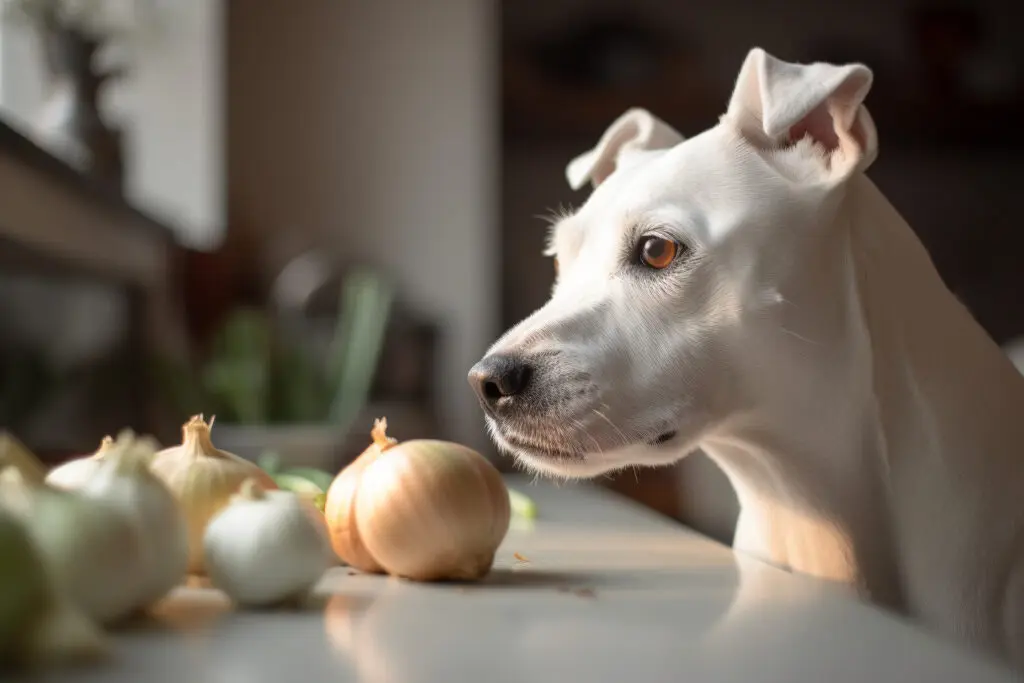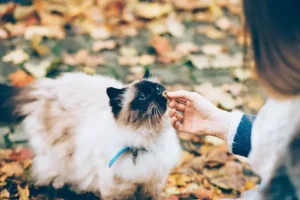Will a Small Amount of Onion Hurt My Dog? As a responsible pet owner, you want to make sure everything your dog eats is safe. It’s common to worry about foods that may seem harmless to humans but could be toxic for dogs. One such food is the onion. Even in small amounts, onions can pose a risk to your dog’s health. In this article, we’ll take a deep dive into why onions are dangerous for dogs, how much can be harmful, and what steps to take if your dog accidentally eats a small amount.
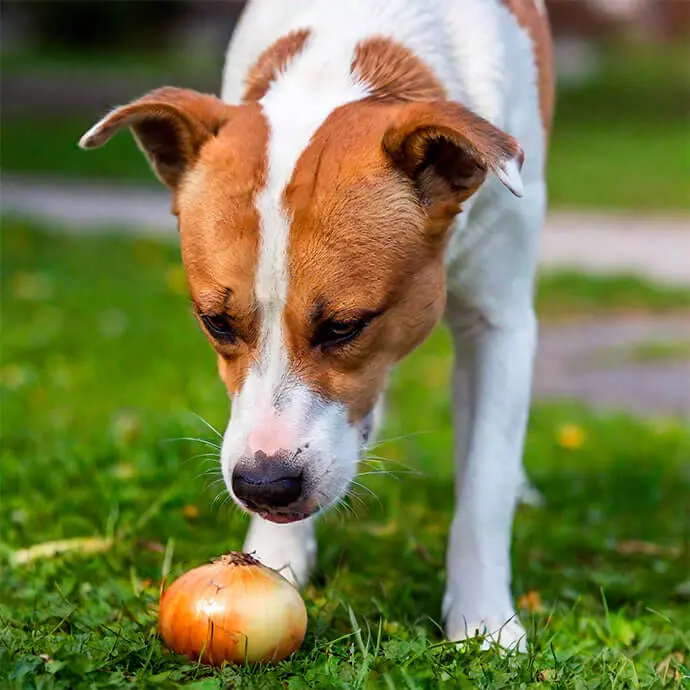
Will a Small Amount of Onion Hurt My Dog? Why Are Onions Harmful to Dogs?
Onions contain compounds called thiosulfates, which are harmless to humans but toxic to dogs. When ingested by a dog, thiosulfates can lead to a condition known as hemolytic anemia. This condition causes red blood cells to break down faster than they can be replaced, leading to a range of health issues, from mild symptoms to severe complications.
Hemolytic anemia can result in oxygen deprivation in tissues, leading to fatigue, weakness, and in severe cases, life-threatening health problems. Even though your dog might not experience symptoms immediately, ingesting onions regularly or in large amounts over time can build up toxicity, causing severe health risks.
How Much Onion Is Toxic for Dogs?
The toxicity level depends on the size of the dog and the amount of onion consumed. Here are some general guidelines on onion toxicity:
- Toxic Dose: According to veterinary experts, ingestion of 0.5% of a dog’s body weight in onions (or related foods like garlic and leeks) can cause toxic effects. For example:
- For a 20-pound dog, ingesting around 1 ounce of onion can be harmful.
- For a smaller dog weighing 10 pounds, even half an ounce can lead to symptoms of toxicity.
- Different Forms of Onion: All forms of onion—whether raw, cooked, powdered, or dried—contain thiosulfates and are toxic to dogs. Foods like onion powder, often used in seasoning and flavored snacks, can be especially dangerous since it is highly concentrated.
- Accumulative Effect: Even small amounts consumed over time can have a cumulative effect on your dog’s body, increasing toxicity levels.
While a single, small bite of onion might not always lead to immediate health issues, it’s still best to avoid letting your dog consume any amount of onion or onion-containing foods.
Symptoms of Onion Toxicity in Dogs
If you suspect your dog has eaten onions, watch for these symptoms of onion toxicity, which may not appear until a day or two after ingestion:
- Lethargy: Your dog may seem unusually tired, lacking its usual energy.
- Weakness and Reduced Activity: Dogs with hemolytic anemia may appear weak, with noticeable difficulty moving around or playing.
- Loss of Appetite: Onion toxicity can cause digestive upset, leading your dog to avoid eating.
- Vomiting and Diarrhea: Gastrointestinal symptoms like vomiting or diarrhea are common with onion ingestion.
- Pale or Yellow Gums: Hemolytic anemia can cause visible changes to your dog’s gum color, turning them pale or even yellow (a sign of jaundice).
- Increased Heart Rate or Panting: Because onion toxicity affects oxygen levels in the blood, your dog’s body may respond with an elevated heart rate or heavy panting.
If your dog exhibits any of these symptoms after consuming onions, it’s important to seek veterinary care as soon as possible.
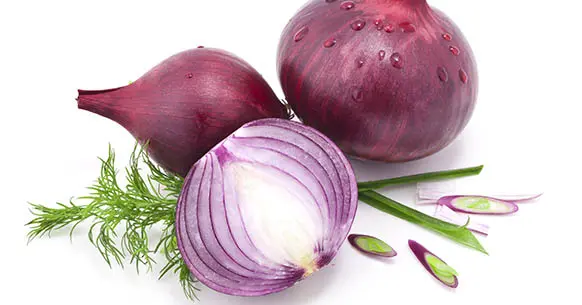
What to Do if Your Dog Eats Onions
- Assess the Amount Eaten: Try to estimate how much onion your dog ingested. Even a small amount can be risky, but knowing the quantity helps when explaining the situation to a veterinarian.
- Observe for Symptoms: Watch your dog closely over the next 24–48 hours. If symptoms appear, do not delay in contacting your vet.
- Seek Immediate Veterinary Assistance: If your dog has ingested even a small amount of onion, contact your veterinarian. They may recommend bringing the dog in for a physical examination or suggest other steps based on your dog’s specific situation.
- Induce Vomiting (Only If Advised by a Vet): In some cases, your vet may advise you to induce vomiting if the ingestion was recent. However, only attempt this if specifically directed by a professional.
- Activated Charcoal: Some veterinarians may suggest administering activated charcoal to help absorb the toxins. Do not give this to your dog without consulting a vet.
Quick action and consultation with a veterinarian can make a big difference, especially if your dog has ingested a significant amount of onion.
Preventing Onion Exposure
Onions are a common ingredient in many foods, so preventing your dog’s exposure can be challenging. Here are some ways to ensure your dog avoids onions:
- Check Ingredients: Many processed foods contain onion powder or onion extract. Always check ingredient labels, especially on foods like soups, baby food, and sauces.
- Avoid Table Scraps: Dogs love to beg for scraps, but feeding them human food increases the risk of exposure to harmful ingredients like onions.
- Educate Family Members and Visitors: Make sure everyone who interacts with your dog is aware of the risks associated with onions. Guests might unknowingly feed your dog scraps that contain onion.
- Secure Your Trash: Dogs are often tempted by garbage, which can contain food scraps with onions. Keep your trash secure to prevent scavenging.
Onion Alternatives for Dog-Safe Recipes
Many pet owners enjoy cooking for their dogs or sharing parts of their own meals. If you’re in this category, it’s wise to consider pet-safe ingredients that won’t harm your dog. Here are some dog-friendly options that can substitute for onions:
- Carrots: Crunchy and sweet, carrots add texture to dog food without any risk of toxicity.
- Celery: Another safe choice, celery provides a mild flavor and is low in calories, making it a healthy addition.
- Bell Peppers: While onions are a no-go, bell peppers are safe and add a hint of sweetness that dogs may enjoy.
Using these alternatives will ensure you’re feeding your dog a safe meal that also adds variety to their diet.
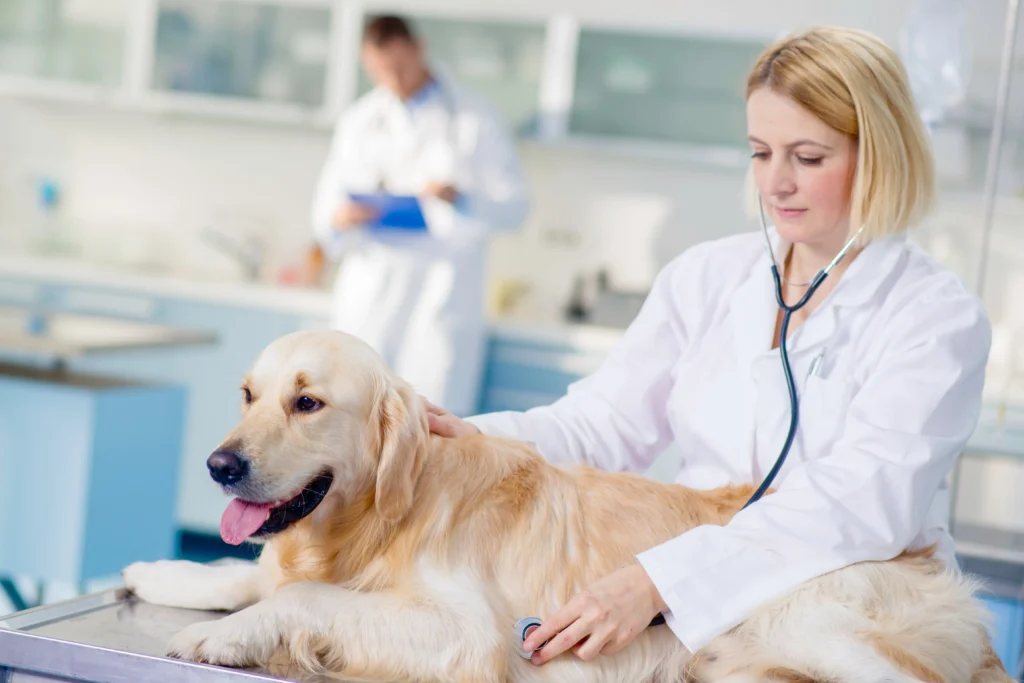
Common Foods That May Contain Onion
Since onion is such a common ingredient, it’s easy to overlook the ways it might end up in your dog’s diet. Here are a few common foods that might contain onion (or onion powder) to avoid:
- Baby Food: Often used as a treat or to disguise medicine, some baby foods contain onion powder.
- Fast Food and Takeout: Many takeout items, especially sauces, contain onions or onion powder.
- Gravies and Sauces: Pre-made gravies or sauces frequently contain onion as a flavour enhancer.
- Broths and Soups: Onion is often used in soup bases. If you want to give your dog broth, make sure it’s onion-free.
- Seasoned Meats: Sausages, hamburger patties, and even deli meats sometimes contain onion or onion powder for added flavour.
When giving your dog any kind of food, it’s best to stick with plain, unseasoned items to avoid accidentally exposing them to onions.
Conclusion
Will a Small Amount of Onion Hurt My Dog? When it comes to onions, even a small amount can be potentially harmful to dogs. Onion toxicity is a serious issue that can lead to a range of health complications, from mild gastrointestinal upset to life-threatening anemia. To keep your dog safe, make sure they never eat onions or onion-containing foods, and educate everyone in your household about this common toxin.
If you ever suspect your dog has ingested onions, consult your veterinarian immediately. Quick action and awareness are key to preventing serious health issues. By keeping your dog’s diet free of onions and other toxic foods, you’ll be supporting their health and happiness for years to come.
